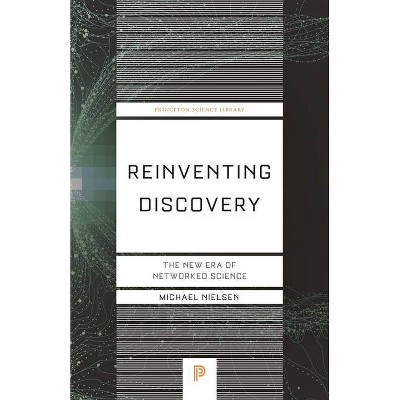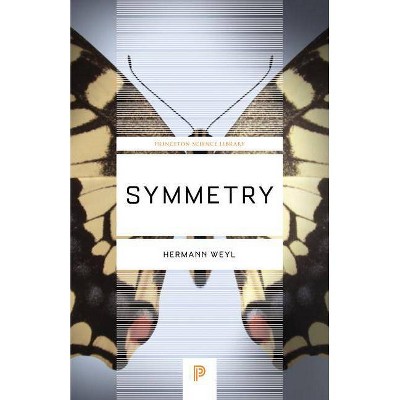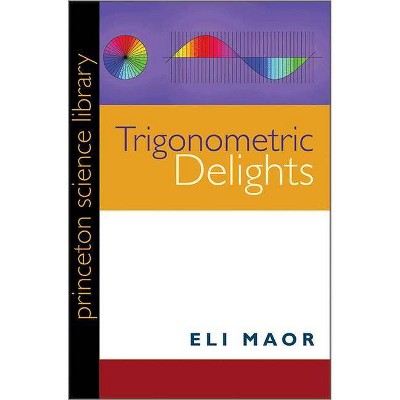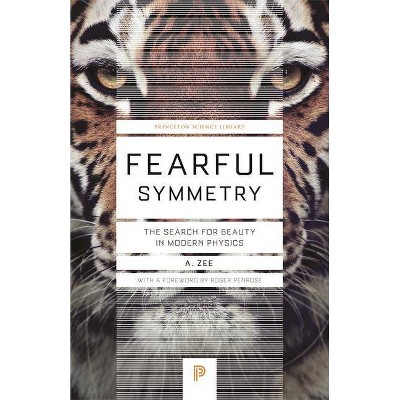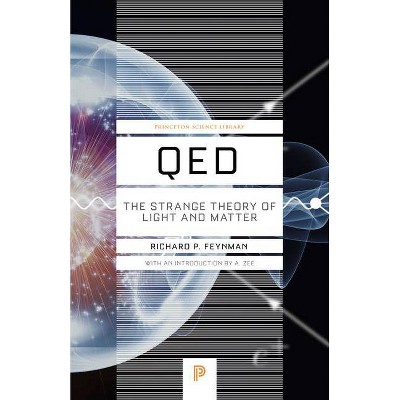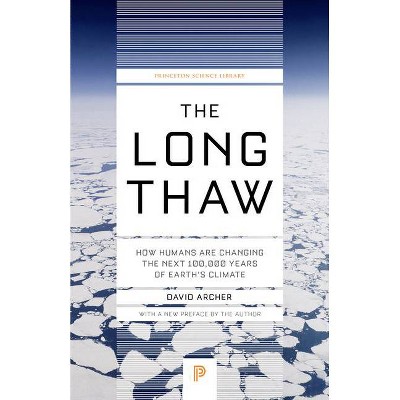Reinventing Discovery - (Princeton Science Library) by Michael Nielsen (Paperback)
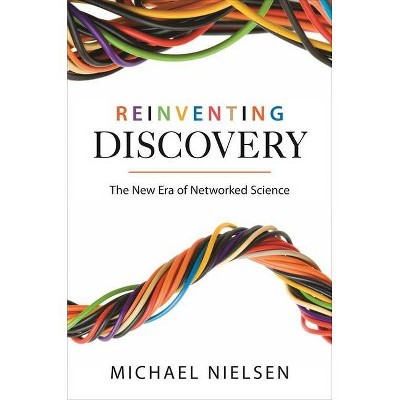
Similar Products
Products of same category from the store
AllProduct info
<p/><br></br><p><b> About the Book </b></p></br></br>"Argues that we are in the early days of the most dramatic change in how science is done in more than 300 years. This change is being driven by new online tools, which are transforming and radically accelerating scientific discovery"--<p/><br></br><p><b> Book Synopsis </b></p></br></br><p><b>How the internet and powerful online tools are democratizing and accelerating scientific discovery</b> <p/>In <i>Reinventing Discovery</i>, Michael Nielsen argues that we are living at the dawn of the most dramatic change in science in more than 300 years. This change is being driven by powerful new cognitive tools, enabled by the internet, which are greatly accelerating scientific discovery. There are many books about how the internet is changing business or the workplace or government. But this is the first book about something much more fundamental: how the internet is transforming the nature of our collective intelligence and how we understand the world. <p/><i>Reinventing Discovery</i> tells the exciting story of an unprecedented new era of networked science. We learn, for example, how mathematicians in the Polymath Project are spontaneously coming together to collaborate online, tackling and rapidly demolishing previously unsolved problems. We learn how 250,000 amateur astronomers are working together in a project called Galaxy Zoo to understand the large-scale structure of the Universe, and how they are making astonishing discoveries, including an entirely new kind of galaxy. These efforts are just a small part of the larger story told in this book--the story of how scientists are using the internet to dramatically expand our problem-solving ability and increase our combined brainpower. <p/>This is a book for anyone who wants to understand how the online world is revolutionizing scientific discovery today--and why the revolution is just beginning.</p><p/><br></br><p><b> From the Back Cover </b></p></br></br><p>"[<i>Reinventing Discovery</i>] opens with a fantastic account of what we can learn about the future of science from explorations such as the Polymath Project and 'the greatest chess game in history, ' Kasparov vs. the World. But what really distinguishes it is its nuanced, intelligent descriptions of just how these projects work, noticing what is important about them in a way that few popular summaries do. . . . Highly recommended!"<b>--Tim O'Reilly, Founder and CEO of O'Reilly Media</b></p><p>"Anyone who has followed science in recent years has noticed something odd: science is less and less about a solitary scientist working alone in a lab. Scientists are working in networks, and those networks are gaining scope, speed, and power through the internet. Nonscientists have been getting in on the act, too, folding proteins and identifying galaxies. Michael Nielsen has been watching these developments too, but he's done much more: he's provided the best synthesis I've seen of this new kind of science, and he's also thought deeply about what it means for the future of how we understand the world. <i>Reinventing Discovery</i> is a delightfully written, thought-provoking book."<b>--Carl Zimmer, author of <i>A Planet of Viruses</i> and <i>The Tangled Bank: An Introduction to Evolution</i></b></p><p>"This is <i>the</i> book on how networks will drive a revolution in scientific discovery; definitely recommended."<b>--Tyler Cowen, author of <i>The Great Stagnation</i></b></p><p>"Science has always been a contact sport; the interaction of many minds is the engine of the discipline. Michael Nielsen has given us an unparalleled account of how new tools for collaboration are transforming scientific practice. <i>Reinventing Discovery</i> doesn't just help us understand how the sciences are changing, it shows us how we can participate in the change."<b>--Clay Shirky, author of <i>Here Comes Everybody</i> and <i>Cognitive Surplus</i></b></p><p>"This wonderful book is a pleasure to read. Michael Nielsen writes in an authoritative yet clear, concise, and accessible style, making an informative and compelling case for open, networked science and how to achieve it."<b>--William Dutton, director of the Oxford Internet Institute</b></p><p>"In <i>Reinventing Discovery</i>, Michael Nielsen introduces us to the new world of the modern scientist, where the Web is amplifying communication and accelerating discovery in unexpected ways, making for extraordinary problem solving. This is a unique and valuable book."<b>--Victoria Stodden, Columbia University</b></p><p/><br></br><p><b> Review Quotes </b></p></br></br><br><i>Reinventing Discovery</i> is a survey, an analysis, a how-to, and a harbinger of greater things to come. Kudos to the author for picking a timely and relevant subject perhaps just on the edge of social consciousness and making a great story out of it.<b>---Robert Schaefer, <i>New York Journal of Books</i></b><br><br><i>Reinventing Discovery</i> is an essential read for anyone wanting to take advantage of knowledge and networking available online.<b>---Georgia Leaker, <i>Cosmos magazine</i></b><br><br><i>Reinventing Discovery</i> provides an important first sketch of the rapidly emerging networked science and makes it clear that certain fields of discovery can take advantage of an unprecedented acceleration enabled by online networks.<b>---Thomas Vogt, <i>Physics Today</i></b><br><br><i>Reinventing Discovery</i> will fire up scholars and scientists to make better use of the internet and join the open science movement. . . . His real contribution, however, is his informed discussion of the social pressures slowing this process of reinvention. . . . Nielsen offers keen insights into how legal, business and academic culture clashes with the pursuit of open science. Our pre-internet thinking is chasing short-term and narrow competitive benefits at the expense of the wider world.<b>---Harold Thimbleby, <i>Times Higher Education</i></b><br><br>[A] thought-provoking call to arms. . . . <i>Reinventing Discovery</i> will frame serious discussion and inspire wild, disruptive ideas for the next decade.<b>---Chris Lintott, <i>Nature</i></b><br><br>[Nielsen's] easy-to-read and enthusiastic narrative integrates a set of ideas that could, indeed, revolutionize knowledge creation. Nielsen offers a set of fascinating examples to illustrate how rapidly emerging methods for innovation produce important discoveries. He goes further to suggest that these will change our concepts of how science gets done and what it means to be a scientist. However, there are substantial systemic and cultural barriers to fully realizing these new forms of cognition and collaboration. . . . With <i>Reinventing Discovery</i>, Nielsen provides an important foundation for moving forward.<b>---Stephen M. Fiore, <i>Science</i></b><br><br>A must read. . . . Nielsen's book serves as a great starting point for any reader interested in scientific discoveries. And even for those who have thought about such issues already, the book will stimulate further thinking.<b>---Joerg Heber, All That Matters blog, <i></i></b><br><br>A powerful plea for scientists to work together in new ways, using the full power of the internet and information technology. Nielsen attacks the possessive attitude to data that still pervades some fields of research and shows how much scientists can gain through more open, collaborative working--which may involve members of the public as well as those inside the academic tent.<b>---Clive Cookson, <i>Financial Times</i></b><br><br>A worthy manifesto for an important cause.<b>---Michael Gilding, <i>Inside Story</i></b><br><br>A The Boston Globe (Anthony Doerr) Best Book in science for 2011<br><br>Although this book is written in the 'popular science' style, it is not as breathless as many comparable texts and it is written by a practising scientist with a widely cited output in the field of quantum computing. It is recommended reading for any academic pathologists.<b>---Simon Cross, <i>Bulletin of the Royal College of Pathologists</i></b><br><br>Excellent. . . . Nielsen's ideas are built on a careful analysis of the past--from the anagrams of Galileo and Newton, to Henry Oldenburg and the invention of the scientific journal, to the invention of peer-review in mid-20th century, to the developments of the past couple of decades since the invention of the World Wide Web. It takes into account people and how they, being human, resist or accept new ways of doing old stuff. It points out the obstacles, and errors one can make in pushing for a more open and more collaborative research. But it also provides a blueprint for how to do it right. And this last thing is why YOU should buy this book and read it carefully--it gives you a cool-headed, calm, thoughtful analysis of the things that work. Use them.<b>---Bora Zivkovic, Blog Around the Clock, <i></i></b><br><br>I highly recommend this book. It's engagingly and persuasively written, while still being measured in its approach to the subject. If you have any interest in the way science is done in the modern age, and how it will be done in the future, you should pick up a copy.<b>---Chad Orzel, Uncertain Principles blog, <i></i></b><br><br>In <i>Reinventing Discovery</i> [Nielsen] has provided the most compelling manifesto yet for the transformative power of networked science.<b>---James Wilsdon, <i>Financial Times</i></b><br><br>In writing this book, Nielsen has created perhaps the most compelling and comprehensive case so far for a new approach to science in the Internet age . . . eloquent, thought-provoking and inspiring to read.<b>---Timo Hannay, <i>Nature Physics</i></b><br><br>Nielsen asks scientists to reinvent what they do, for the good of science and the good of society. His call to arms is timely and important.<b>---Jack Stilgoe, <i>The Guardian</i></b><br><br>Nielsen has been advocating 'Open Science': the idea that science would progress faster and more efficiently if we took advantage of the internet and social communication to create collaborative projects that would have previously been impossible. In this book he lays out the case, peering into the future to unveil a dramatic new mode of learning about the universe.<b>---Sean Carroll, Cosmic Variance blog, <i>Discover Magazine</i></b><br><br>Nielsen's book is a thorough primer on what he calls 'networked science.'. . . We are in the midst of a revolution, Nielsen argues, in which networked science can solve problems at the limit of human understanding--and may even change the world. That claim may sound over the top, but Nielsen makes a compelling case in this self-described manifesto. With friendly, engaging writing, he describes specific approaches and characteristics that can make collaborations truly bloom.<b>---Rachel Ehrenberg, <i>Science News</i></b><br><br>Nielsen's book is an amazing collection of interesting examples, important protagonists and references. It makes illustrative comparisons to open source software development. With his easily readable, well explained and perfectly argued style, Nielsen manages to keep the reader interested in this rather dry philosophical topic throughout the whole book. . . . [T]he book provides a comprehensive overview of developments in open science and is more than worth the reading time for someone interested in the foundations of science.<b>---Florian Fisch, <i>Lab Times</i></b><br><br>Nielsen's book is timely and makes the case that scientists have the 'opportunity to change the way knowledge is constructed.' Librarians reading this book will find content that is familiar such as the discussions on open access, open data, and data citation initiatives. The take-away is that Nielsen, as a scientist, is addressing his peers on topics that are also important to librarians. Perhaps Nielsen's <i>Reinventing Discovery: The Era of Networked Science</i> will be the impetus for 'lighting an almighty fire under the scientific community' in creating an open scientific culture.<b>---Barbara Losoff, <i>portal: Libraries and the Academy</i></b><br><br>Presenting complex ideas clearly, Nielson explores in his first book how online collaborative tools, networked science, and open data policies are revolutionizing the process of discovery. He presents a clear vision of science's future and challenges us to bring it to fruition. . . . Both captivating and enlightening, this book is recommended for general readers or specialists interested in how online collaboration tools, open data policies, and networked science might benefit the future of science and humanity.<b>---Jonathan Bodnar, <i>Library Journal</i></b><br><br>The lone white-coated scientist working late, eye pressed to the eyepiece? That trope is no more. Nowadays impressive science (in mathematics, genetics, astronomy) is being accomplished by crowds using the tools of the Internet. Nielsen believes that mass collaboration is the future of science, and his book may be the most interesting piece of nonfiction I read this year.<b>---Anthony Doerr, <i>Boston Globe</i></b><br><br>This book is suited to a wide audience: those interested in greater detail . . . can view the appendix, bibliographic essay, and references at the end of the book, but Nielsen has written the main text in an engaging narrative style. Suitable for communities served by academic, public, and perhaps secondary school libraries, Nielsen's work is enjoyable and compelling.<b>---Lia Vella, <i>Issues in Science and Technology Librarianship</i></b><br><br>Michael Nielsen makes the case for the wisdom of very smart crowds in an optimistic argument for the way a wired world can change the way science works. In all sorts of examples, from a Garry Kasparov v the world chess game, to mathematicians and astronomers combining to solve problems he shows how the internet can increase the size and speed of scientific collaboration.<b>---Stephen Matchett, <i>The Australian</i></b><br><br>Nielsen likens today's resistance to online tools by scientists to the days of the anagram. The analogy may sound critical of our current scientific culture, but he's also saying that like Galileo and his peers, we're ready for revolutionary change. It's already happening, and Nielsen's book is rich with beautiful and surprising examples.-- "Daily Kos"<br><br>One of Financial Times (FT.com) non-fiction favourites in the Science category for 2011<br><br>Quantum computation specialist Nielsen is an impassioned advocate for open science. In a modern networked world, how can science happen differently? Nielsen successfully communicates his vision in <i>Reinventing Discovery</i>. . . . Nielsen is frank about the challenges to open science, and he offers a plan for action.-- "Choice"<br><br>This is a book for anyone who wants to understand how the online world is revolutionizing scientific discovery today--and why the revolution is just beginning.-- "World Book Industry"<br><p/><br></br><p><b> About the Author </b></p></br></br>Michael Nielsen is one of the pioneers of quantum computing. He is an essayist, speaker, and advocate of open science. He lives in Toronto.
Price History
Price Archive shows prices from various stores, lets you see history and find the cheapest. There is no actual sale on the website. For all support, inquiry and suggestion messagescommunication@pricearchive.us
